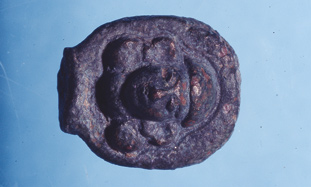The riddle of the identity of a 3,200-year-old round bronze tablet with a carved face of a woman has apparently been solved, 13 years after it was discovered  at the El-ahwat excavation site between Katzir-Harish and Nahal Iron (Wadi Ara) by scientist Oren Cohen of the University of Haifa.
at the El-ahwat excavation site between Katzir-Harish and Nahal Iron (Wadi Ara) by scientist Oren Cohen of the University of Haifa.
The small, broken-off piece of metal is probably part of a linchpin that held the wheel to a war chariot sent to battle by the Canaanite general Sisera against the Israelites, says Prof. Adam Zertal, who for 33 years has led weekly walks with university colleagues and volunteers over “every square meter” of Samaria and the Jordan Rift to search for archeological evidence from biblical times.>>>
"2000-year-old human skeleton found at Gloucestershire Roman villa dig," This Is Gloucestershire, July 5, 2010The small, broken-off piece of metal is probably part of a linchpin that held the wheel to a war chariot sent to battle by the Canaanite general Sisera against the Israelites, says Prof. Adam Zertal, who for 33 years has led weekly walks with university colleagues and volunteers over “every square meter” of Samaria and the Jordan Rift to search for archeological evidence from biblical times.>>>
A 2,000-YEAR-OLD human skeleton has been unearthed alongside Iron Age artefacts near Tewkesbury.
Archaeologists uncovered signs of the ancient Roman villa in a field on the edge of Bredon's Norton. It is thought the finds could be of national importance.
Metal detector hunts in recent years had led historians to suspect an ancient community might be found there.
That was confirmed when contractors who were laying a new water pipeline began digging.>>>
Archaeologists uncovered signs of the ancient Roman villa in a field on the edge of Bredon's Norton. It is thought the finds could be of national importance.
Metal detector hunts in recent years had led historians to suspect an ancient community might be found there.
That was confirmed when contractors who were laying a new water pipeline began digging.>>>
"Female 'gladiator' remains found in Herefordshire," BBC, July 1, 2010
Amongst the evidence of a Roman suburb in Credenhill, they have found the grave of a massive, muscular woman.
The archaeological Project Manager, Robin Jackson, said: "Maybe the warrior idea is one that you could pursue, I'll leave that to people's imaginations."
Her remains were found in a crouched position, in what could be a suburb of the nearby Roman town of Kenchester.>>>
The archaeological Project Manager, Robin Jackson, said: "Maybe the warrior idea is one that you could pursue, I'll leave that to people's imaginations."
Her remains were found in a crouched position, in what could be a suburb of the nearby Roman town of Kenchester.>>>
Nicole Winfield, "Lasers uncover first icons of Sts. Peter and Paul" AP, June 22, 2010
ROME — Twenty-first century laser technology has opened a window into the early days of the Catholic Church, guiding researchers through the dank, musty catacombs beneath Rome to a startling find: the first known icons of the apostles Peter and Paul.
Vatican officials unveiled the paintings Tuesday, discovered along with the earliest known images of the apostles John and Andrew in an underground burial chamber beneath an office building on a busy street in a working-class Rome neighborhood.>>>
Vatican officials unveiled the paintings Tuesday, discovered along with the earliest known images of the apostles John and Andrew in an underground burial chamber beneath an office building on a busy street in a working-class Rome neighborhood.>>>
Dinesh Ramde, "Chilly waters preserve 1890s shipwreck well," San Francisco Chronicle, June 25, 2010
A great wooden steamship that sank more than a century ago in a violent Lake Michigan storm has been found off the Milwaukee-area shoreline, and divers say the intact vessel appears to have been perfectly preserved by the cold fresh waters.
Finding the 300-foot-long L.R. Doty was important because it was the largest wooden ship that remained unaccounted for, said Brendon Baillod, president of the Wisconsin Underwater Archaeology Association.>>>
Finding the 300-foot-long L.R. Doty was important because it was the largest wooden ship that remained unaccounted for, said Brendon Baillod, president of the Wisconsin Underwater Archaeology Association.>>>






No comments:
Post a Comment